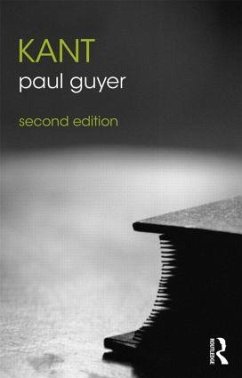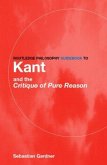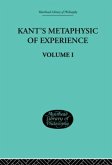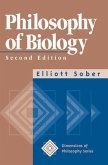In this updated edition of his outstanding introduction to Kant, Paul Guyer uses Kant's central conception of autonomy as the key to his thought.
Beginning with a helpful overview of Kant's life and times, Guyer introduces Kant's metaphysics and epistemology, carefully explaining his arguments about the nature of space, time and experience in his most influential but difficult work, The Critique of Pure Reason. He offers an explanation and critique of Kant's famous theory of transcendental idealism and shows how much of Kant's philosophy is independent of this controversial doctrine.
He then examines Kant's moral philosophy, his celebrated 'categorical imperative' and his theories of duty, freedom of will and political rights. This section of the work has been substantially revised to clarify the relation between Kant's conceptions of "internal" and "external" freedom. In his treatments of Kant's aesthetics and teleology, Guyer focuses on their relation to human freedom and happiness. Finally, he considers Kant's view that the development of human autonomy is the only goal that we can conceive for both natural and human history.
Including a chronology, glossary, chapter summaries and up-to-date further reading, Kant, second edition is an ideal introduction to this demanding yet pivotal figure in the history of philosophy, and essential reading for all students of philosophy.
Beginning with a helpful overview of Kant's life and times, Guyer introduces Kant's metaphysics and epistemology, carefully explaining his arguments about the nature of space, time and experience in his most influential but difficult work, The Critique of Pure Reason. He offers an explanation and critique of Kant's famous theory of transcendental idealism and shows how much of Kant's philosophy is independent of this controversial doctrine.
He then examines Kant's moral philosophy, his celebrated 'categorical imperative' and his theories of duty, freedom of will and political rights. This section of the work has been substantially revised to clarify the relation between Kant's conceptions of "internal" and "external" freedom. In his treatments of Kant's aesthetics and teleology, Guyer focuses on their relation to human freedom and happiness. Finally, he considers Kant's view that the development of human autonomy is the only goal that we can conceive for both natural and human history.
Including a chronology, glossary, chapter summaries and up-to-date further reading, Kant, second edition is an ideal introduction to this demanding yet pivotal figure in the history of philosophy, and essential reading for all students of philosophy.
'The synoptic organization of this second edition illuminatingly represents the systematic structure of Kant's philosophical ideas. ... Guyer's discussion is careful and thorough, situating detailed consideration of elements and arguments in the context of Kant's thought as a whole, as well as its intellectual background. ... [N]o text will provide a better or more helpful survey of Kant's achievement for advanced students or academic professionals. Summing Up: Highly recommended.' - Roman P. Bonzon, CHOICE
Praise for the first edition:
'This is the clearest, most comprehensive book on Kant's "critical philosophy" written in English... Guyer's book is clearly written and keeps enough distance from Kant's texts to be helpful to nonspecialists; it also stays close enough to be nuanced and valuable even for Kant specialists.' - A.N. Bunch, CHOICE
'Kant is an absolutely first-rate general introduction to Kant's Critical Philosophy. Paul Guyer's interpretations are extremely well-supported, carefully and crisply argued, and highly insightful.' - Robert Hanna, University of Colorado, USA
'An impressive overview of the various strands of Kant's philosophy. With great skill Guyer manages to compress Kant's critical thought into a few hundred pages. This book will provide an excellent introduction to Kant's thought.' - Philip Stratton-Lake, University of Reading, UK
'That Guyer is able to cover this much material, clearly and without oversimplification, in a single, reasonably sized volume represents a unique accomplishment, which should prove to be extremely useful to a broad audience.' - Eric Watkins, University of California, San Diego, USA
Praise for the first edition:
'This is the clearest, most comprehensive book on Kant's "critical philosophy" written in English... Guyer's book is clearly written and keeps enough distance from Kant's texts to be helpful to nonspecialists; it also stays close enough to be nuanced and valuable even for Kant specialists.' - A.N. Bunch, CHOICE
'Kant is an absolutely first-rate general introduction to Kant's Critical Philosophy. Paul Guyer's interpretations are extremely well-supported, carefully and crisply argued, and highly insightful.' - Robert Hanna, University of Colorado, USA
'An impressive overview of the various strands of Kant's philosophy. With great skill Guyer manages to compress Kant's critical thought into a few hundred pages. This book will provide an excellent introduction to Kant's thought.' - Philip Stratton-Lake, University of Reading, UK
'That Guyer is able to cover this much material, clearly and without oversimplification, in a single, reasonably sized volume represents a unique accomplishment, which should prove to be extremely useful to a broad audience.' - Eric Watkins, University of California, San Diego, USA








